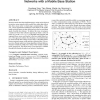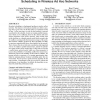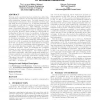115
click to vote
MOBIHOC
2008
ACM
16 years 17 days ago
2008
ACM
Recent research shows that significant energy saving can be achieved in wireless sensor networks with a mobile base station that collects data from sensor nodes via short-range co...
112
Voted
MOBIHOC
2008
ACM
16 years 17 days ago
2008
ACM
Due to the long propagation delay and high error rate of acoustic channels, it is very challenging to provide reliable data transfer for time-critical applications in an energy-ef...
119
Voted
MOBIHOC
2008
ACM
16 years 17 days ago
2008
ACM
Broadcast scheduling is a fundamental problem in wireless ad hoc networks. The objective of a broadcast schedule is to deliver a message from a given source to all other nodes in ...
100
click to vote
MOBIHOC
2008
ACM
16 years 17 days ago
2008
ACM
For long, node cooperation has been exploited as a data relaying mechanism. However, the wireless channel allows for much richer interaction between nodes. One such scenario is in...
MOBIHOC
2008
ACM
16 years 17 days ago
2008
ACM
We present Virtual Cord Protocol (VCP), a virtual relative position based routing protocol for sensor networks that also provides methods for data management as known from standar...
120
click to vote
MOBIHOC
2008
ACM
16 years 17 days ago
2008
ACM
We address the cost incurred in increasing the transport capacity of wireless ad hoc networks over what can be attained when sources and destinations communicate over multi-hop pa...
121
click to vote
MOBIHOC
2008
ACM
16 years 17 days ago
2008
ACM
Relay-enabled wireless networks (eg. WIMAX 802.16j) represent an emerging trend for the incorporation of multi-hop networking solutions for last-mile broadband access in next gene...
120
click to vote
MOBIHOC
2008
ACM
16 years 17 days ago
2008
ACM
Wireless LAN (WLAN) radios conserve energy by staying in sleep mode. With real-time applications like VoIP, it is not clear how much energy can be saved by this approach since pac...
114
click to vote
MOBIHOC
2008
ACM
16 years 17 days ago
2008
ACM
We study the multicast capacity of a random wireless network consisting of ordinary wireless nodes and base stations, known as a hybrid network. Assume that n ordinary wireless no...
102
Voted
MOBIHOC
2008
ACM
16 years 17 days ago
2008
ACM



